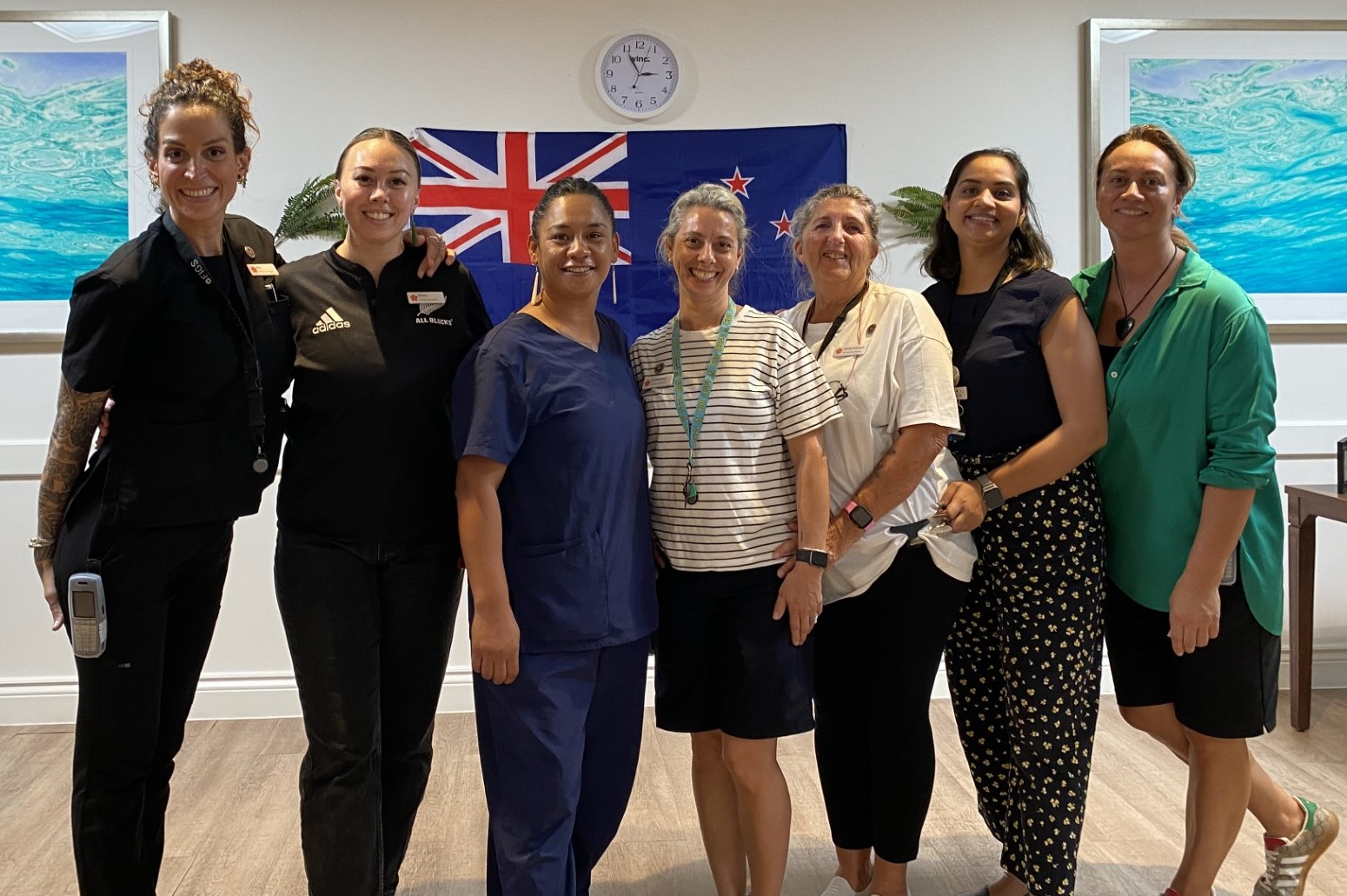
When your parents move into Aged Care, it can sometimes be a challenging transition for the entire family. While it’s natural to feel concerned about your mum or dad’s wellbeing, and to have lots of Aged Care questions, staying informed and maintaining regular communication can help ease these worries, and ensure your parent continues to feel loved and supported. Regular contact not only benefits their emotional health, but also keeps you connected to their daily lives and care needs.
At TriCare, we understand the importance of family involvement in Aged Care. We work to create an environment where communication between residents, their families, and our care teams is positive and effective. Here are some ideas you can use to stay connected and informed – whether you’re down the road or across the country.
1. Schedule regular visits
If you’re local, in-person visits can be helpful for maintaining a strong connection with your parents in Aged Care. These visits provide an opportunity for face-to-face interaction, allowing you to assess their wellbeing firsthand and offer emotional support. Regular visits can significantly boost morale, reduce feelings of loneliness, and enhance overall quality of life.
To make your visits meaningful and enjoyable, you can:
- Plan activities: Engage in activities your parents enjoy, such as playing board games, taking walks, or watching their favourite movies.
- Be present: Give your undivided attention while you’re here. Put away your phone and focus on meaningful conversations.
- Bring comforts of home: Bringing familiar items like photos, favourite snacks, or a beloved book can make visits more comforting and enjoyable.
- Stay positive: Maintaining a positive attitude can help lift their spirits and make the time spent together pleasant.
TriCare offers flexible visiting hours to accommodate your schedule and ensure you have plenty of opportunities to spend time with your loved ones. All of our residences have comfortable, welcoming spaces designed for family interactions, including quiet rooms and outdoor areas. We also encourage families to join in our social events and create lasting memories together.

2. Use technology for virtual check-ins
When in-person visits aren’t possible, technology can offer a valuable alternative to stay connected. Video calls and regular phone check-ins give you the chance to see and hear your parents, providing comfort and reassurance for both parties. These virtual interactions can help you to maintain a sense of closeness and continuity in your relationship, reducing feelings of isolation for your parents.
You can use technology such as:
- Video call apps: Platforms like Zoom, Skype, and FaceTime are user-friendly and widely accessible, making them ideal for regular check-ins.
- Messaging apps: Apps like WhatsApp and Facebook Messenger offer easy-to-use interfaces for both video calls and text messaging.
- Specialised tools: Devices like the Amazon Echo Show and Google Nest Hub can simplify video calls with voice commands, which can be particularly helpful for older users.
Our staff are happy to help our residents to set up and use these tools, so they can easily connect with their families.
3. Participate in care meetings
We think care is always better when the family is actively involved. Participating in care meetings offers a platform for you to discuss your parent’s care plan, address any concerns, and make informed decisions about their care. Being involved helps ensure that your parent’s needs and preferences are met, and that you are aware of any changes in their condition or treatment.
You can prepare by:
- Being informed: Review any available information about your parent’s health and care plan before the meeting.
- Preparing questions: Write down any questions or concerns you have to ensure they are addressed during the meeting.
- Taking notes: Document the discussion and any action items to stay organised and follow up as needed.
- Staying engaged: Actively participate in the conversation, listen to the caregivers’ insights, and provide your input.
TriCare values family involvement in care planning, and we encourage regular participation in care meetings. We schedule these meetings at convenient times for families and provide clear communication about the agenda and objectives. We like to work together with families to ensure they are fully informed and involved in the decision-making process, promoting a holistic approach to care.
4. Create a communication plan with caregivers
Having open lines of communication with caregivers is important because it helps you to stay up to date on your parent’s condition and care. It means you can receive timely information and can address any concerns as they arise.
To set realistic expectations for communication, it can help to agree on:
- Frequency of updates: Decide how often you would like to receive updates on your parent’s wellbeing, whether it’s regular or as needed.
- Preferred methods: Choose the best communication methods for you, whether it’s phone calls, emails, or text messages.
- Share key contacts: Decide who is the primary contact on both sides, as well as others who can be contacted or notified when required.
At TriCare, our caregivers are well trained in providing regular updates and promptly addressing your questions or concerns. We also organise regular family meetings and feedback sessions to ensure open lines of communication and continuous improvement in our care services.

5. Send personal touches and reminders of home
Personal touches can make a big difference in lifting your parent’s spirits and helping them feel connected to home. Letters and cards, photographs, and care packages with things like puzzles and favourite snacks are very popular. This can help our residents to feel comforted and help reduce feelings of loneliness. And these gestures show that they are loved and thought of, no matter how far away you are.
Our team always ensures personal items are delivered to residents promptly, and that we provide assistance if needed to open gifts and arrange and display photographs and personal items.
6. Engage in activities together
Joining in activities together can also enhance your parent’s wellbeing and strengthen your bond while they are living in Aged Care. We recommend family members participate in events that we organise when they can, to spend quality time together. We find that shared activities create positive experiences and new memories, fostering a deeper connection. Whether it’s games, hobbies, or a social event, these interactions can significantly improve your parent’s happiness and sense of belonging.
From arts and crafts to fitness classes and social gatherings, each of our Aged Care Residence has a calendar of events, which can be opportunities for you to engage with your parent.
7. Advocate for your parent’s needs
Being an advocate for your parent means ensuring that their needs and preferences are met wherever possible. Communicating clearly with caregivers about your parent’s likes, dislikes, and any specific requirements they may have can make a big difference.
To advocate effectively, we recommend you:
- Be clear and specific: Clearly articulate your parent’s needs and preferences.
- Stay respectful: Maintain a respectful and cooperative tone when discussing concerns, so everyone is on the same page.
- Follow up: Regularly check in with your parent to ensure that their needs are being met.
At TriCare, we prioritise individualised care and encourage family advocacy. We work closely with families to understand and accommodate the unique needs of each resident where we can. Our open-door policy ensures that families can easily communicate their concerns and collaborate with our care team to provide the best possible care.
8. Educate yourself on Aged Care policies and procedures
Knowing the policies and procedures of your parent’s Aged Care Residence can help you navigate the system and advocate effectively for your parent. It ensures that you are aware of the standards and expectations governing their care.
You can learn about these through:
- Government websites: The Australian Government’s Aged Care Quality Standards outline expectations for all Aged Care Residences.
- TriCare’s Aged Care Guide: Review the residence’s handbook or guide for detailed policies.
Tricare is committed to transparency and education. We provide comprehensive information about our policies and procedures, and our staff is always available to answer questions and provide clarity on any aspect of our care services.
Want to learn more about TriCare Aged Care? Call us on 1800 874 2273 or click on the link below to arrange an inspection.




